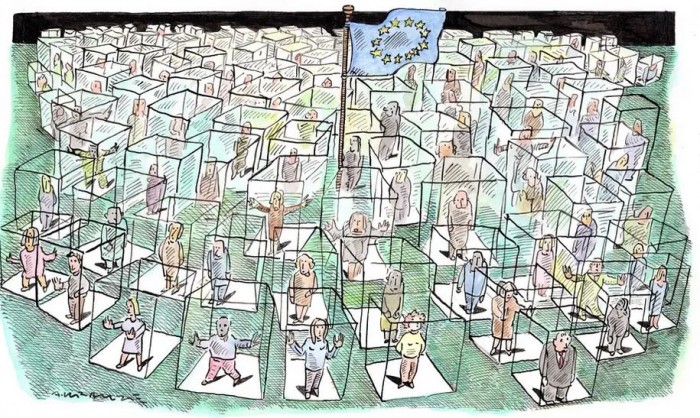German virologist Kekulé proposes the thesis that lockdown damage is greater than the corona damage
von Express, 13 April 2020, German translation by Milena Rampoldi, ProMosaik.
What will the return to normal life after the “corona lockdown” look like? It is unlikely that the restrictions to contain the Sars CoV-2 pandemic will remain in place. Not only the economic damage seems to be too big.

Lockdown, von Andrzej Krauze/The Guardian
For the epidemiologist Prof. Alexander Kekulé (61), known from the programme “Kekulés Corona compass” (on the German channel MDR), the matter is clear. “We cannot wait for a vaccine by living in the lockdown mode for another six to twelve months. If we did this, our society and our culture would be totally destroyed,” he said to The Telegraph.
The holder of the Chair for Medical Microbiology and Virology at Martin Luther University in Halle (Saale) had already warned against the coronavirus on 22 January 2020 by suggesting testing travellers at German airports and borders.
However, nobody listened to him at that time. The Robert Koch-Institut (RKI) which, as it is well-known, wrote a situation report about the new Coronavirus on 6 March affirming that the health risk of the population in Germany was “currently assessed as moderate” did not listen to him. And the Federal Government did the same.
“If at that time we had started testing and monitoring the infection chains, we would have been able to avoid the lockdown,” so Kekulé. The 61-year-old often takes an extreme position. And he has already been criticized a lot for that by other virologists like Hendrik Streeck, Christian Drosten and Jonas Schmidt-Chanasit (welt.de: “I think that the statement by the colleague is pretty dangerous”).
Alexander Kekulé: The Corona lockdown was correct, but …
However, there is a consensus on the assessment of the lockdown, including Kekulé. “It was the only option available to slow the spread of the virus and protect hospitals from being overwhelmed with a large number of patients,” Alexander Kekulé stated. However, now a rethink is required: “We have to consider the possibility that the lockdown results in more damage than the virus itself.”
Also, Armin Laschet would like to gradually return to normality.
Without any doubt, North Rhine-Westphalia Prime Minister Armin Laschet can follow this advice. And not just for economic reasons. On Easter Sunday, he tweeted: “Even now, the lockdown results in health damage due to postponed operations and rehabilitation measures, depression, loneliness, domestic violence and endangering of the child well-being.” Before that, in his Easter speech, Laschet had announced that the lockdown would be loosened.
On Wednesday at the latest, the proposals of an expert council will be discussed with Chancellor Angela Merkel to be then weighed up together as to whether, when and which lockdown can occur.
Alexander Kekulé proposes a plan consisting of three-steps:
- The elderly and people with previous illnesses, i.e. those who face the most coronavirus risk, should remain isolated. Kekulé: “We have to convince them to do so by staying at home. However, we also must find ways to make the situation tolerable for them, by giving them the chance to go shopping and have a social life for example. When this vulnerable group leaves the house, a mouth protection or mask is mandatory.”
- There should also be a mask requirement for certain professional groups such as cashiers. “We all have to get used to wearing face masks,” Kekulé says. And he is not the only one making this proposal. If there is a sufficient number of masks available, the mask duty is considered as meaningful by a team of 14 scientists and physicians. This mask duty should not necessarily apply in the fresh air, but inside buildings. Kekulés slogan says: “No hero without a mask.”
- The 61-year-old virologist suggests that young people be (consciously) infected with Sars-CoV-2 to become immune as quickly as possible. In general, for the age groups under 50, the course of the disease is harmless. Consequently – according to the epidemiologist – schools and kindergartens must first be opened after the lockdown. Denmark is already planning this after Easter.
Corona risk in younger people: “We have to cope with these dead people …”
Kekulé addresses the objection that younger people can die from the consequences of the coronavirus in a very objective manner by saying that among the few who died, the immune system overreacted and attacked the own body and by adding: “I know that it may sound heartless, but we have to live with these numbers of dead people.”
The only option is to achieve the so called “herd immunity”. Kekulé concludes: “We cannot wait for a vaccine. We have to find a way to live with the virus.”


